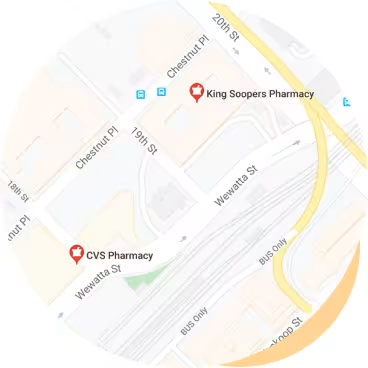- Urgent Care
Upper Respiratory Infection (URIs)
Upper respiratory infection treatment available today
In order to treat your upper respiratory infection, consult with one of our board-certified doctors online today to prescribe medications to get relief from sore throat and congestion. Get a new prescription to treat an upper respiratory infection or refill an existing prescription today.*
Book an appointmentEarly diagnosis by board-certified doctors*
Effective prescriptions for respiratory relief
Manage upper respiratory symptoms and treatment online
*Prescriptions are provided at the doctor's discretion. Learn more about our controlled substances policy and how to save up to 80% with our prescription discount card. PlushCare doctors cannot treat all cases of Upper Respiratory Infection. Our primary care physicians can conduct an initial evaluation of your symptoms but may need to refer you to a specialist or for in-person treatment. If you are experiencing life-threatening symptoms, seek emergency medical attention immediately.

Learn about upper respiratory infections
The respiratory system is the part of your body that is responsible for breathing. The respiratory system is divided into the upper respiratory tract and the lower respiratory tract. The upper respiratory tract comprises of nose, sinuses, pharynx, larynx, and large upper airways. Most people will experience an upper respiratory infection at some point in life. Upper respiratory infections are very common, and include:
Epiglottis infection (epiglottitis)
Upper respiratory infection causes
An acute upper respiratory tract infection is a short-term bacterial or viral infection. The common cold is an example of a viral acute upper respiratory infection. Other causes of upper respiratory infections include bacteria, environmental irritants (such as airborne pollution or tobacco smoke), and allergies.
The virus/bacteria/environmental irritants can enter your respiratory system via the following ways:Breathing in air containing the virus/bacteria/environmental irritants - an infected person sneezes or coughs, causing the virus/bacteria to become airborne
Touching an infected surface or shake hands with a person who’s sick, then touching your mouth, nose or eyes
Upper respiratory infection symptoms
The hallmark symptom of an upper respiratory infection is a sudden onset of symptoms, which can include the following:
Runny nose
Nasal congestion
Sneezing
Hoarse voice
Red eyes
Some patients may also experience the following symptoms:Malaise / feeling run down
Fatigue
Fever
The symptoms usually present themselves one to three days after exposure and last seven to ten days, sometimes lasting as long as three weeks.

How to treat an upper respiratory infection
There are a plenty of steps you can take to treat your symptoms and speed up your recovery.
Physicians may prescribe medications to treat upper respiratory infections in patients. The different medications are covered in the next section.
In addition to medications, some home remedies you can try to help recovery are:
Getting enough sleep
Drinking plenty of fluids, which can thin mucus and prevent dehydration
Steaming your face with a warm towel, which can help open up your sinuses and relieve congestion
Honey to help reduce coughing
Gargling saltwater to help reduce swelling
Saline nasal rinse (can help with sinus infections)
By following these simple guidelines, you can easily get rid of your upper respiratory infection quickly and get back to feeling your best.
Upper respiratory infection medications
There are a number of different medications that can be used to treat upper respiratory infections in patients. In the case of a bacterial infection, antibiotics can help kill the bacteria that are causing the infection. Antibiotics are usually prescribed for seven to ten days.
Other common upper respiratory infection medications include:
Over-the-counter pain relievers
Such as acetaminophen (Tylenol) or ibuprofen (Motrin) to reduce pain and bring down a fever
Antihistamines
Like diphenhydramine (Benadryl) can relieve allergy symptoms
Cough suppressants
(Can be over-the-counter or prescription)
Decongestants
That can help reduce swelling in the nasal passages due to sinus infection
In some cases, a short course of steroids may also be prescribed. These medications can help speed up the recovery process and make the symptoms more tolerable. However, it is important to take them as directed and finish the entire course of treatment to ensure that the infection does not return.

How to prevent an upper respiratory infection
The best way to avoid getting an upper respiratory tract infection is by practicing proper hygiene, such as:
Washing your hands frequently, especially before you eat
Covering when coughing or sneezing to reduce spread
Cleaning surfaces that are commonly touched, like door handles and countertops
Keeping away from people who might be sick
Isolating yourself when you are sick to prevent spread
Additionally, it's important to get vaccinated against the flu every year. If you do start to feel sick, it's important to see a doctor early so they can prescribe antiviral medication, if necessary.

When to see a doctor for an upper respiratory infection
While upper respiratory infections are usually mild and resolve on their own within a week or two, some people may experience more severe symptoms that require medical attention. If you have an upper respiratory tract infection and are experiencing any of the following symptoms, it’s time to see a doctor:
Persistent fever (more than three days)
High fever (over 103 °F)
Loss of consciousness
Severe headache or ear pain
Difficulty breathing or shortness of breath
Painful swallowing or loss of appetite
Coughing up blood or greenish mucus
Wheezing in the chest
Swelling in the face or neck
If you have a weak immune system or are at risk for complications from an upper respiratory infection, it’s also important to see a physician as soon as possible.
Upper respiratory infection treatment FAQs
What are the symptoms of an acute upper respiratory infection?
Upper respiratory infection symptoms may vary depending on the severity and where the infection is located, but may include: nasal congestion, running nose, sneezing, inability to smell, cough, coughing up phlegm, wheezing, body aches, fatigue, fever, scratchy or sore throat, pain when swallowing, headache, sinus pain, foul breath, shortness of breath, itchy, watery eyes, nausea, vomiting, diarrhea.
What are the best at-home treatments for an upper respiratory infection?
Many mild respiratory infections can usually be treated at home. Treatment may include: rest, drinking plenty of fluids, avoiding cold, dry air, over-the-counter pain relievers such as acetaminophen (Tylenol) or ibuprofen (Motrin) to reduce pain and bring down a fever, cough medicine (can be over the counter or prescription), honey for a cough, especially when added to tea, oral or nasal decongestants to reduce nasal congestion, inhaling steam or using a humidifier, gargling saltwater, and saline nasal rinse.
When should I see a doctor for a cough?
If you have a cough and are experiencing any of the following symptoms, it’s time to see a doctor:
Difficulty breathing or shortness of breath
Persistent fever (more than three days)
High fever (over 103 °F)
Painful swallowing or loss of appetite
Coughing up blood or greenish mucus
Loss of consciousness
Severe headache or ear pain
Wheezing in the chest
Swelling in the face or neck
The doctor will diagnose your condition as viral or bacterial and recommend an effective treatment course. If your infection is bacterial, antibiotics will be prescribed. If your infection is viral, symptom management methods will be prescribed to help you recover.
Can a cold be treated online?
Yes, online doctors can treat colds, coughs, congestion, and upper respiratory infections. One of our online doctors will meet with you via phone or video to discuss your symptoms, assess your medical condition, make a diagnosis, and recommend a course of treatment, including any necessary prescription medications that are not classified as a controlled substance.
3 simple steps to get treated for an upper respiratory infection today

Step 1
Book an upper respiratory infection treatment appointment.
Book a same day appointment from anywhere.

Step 2
Talk to your medical provider regarding your upper respiratory infection symptoms.
Visit with a doctor on your smartphone or computer.

Step 3
Pick up a prescription for your upper respiratory infection.
We can send prescriptions to any local pharmacy.
Related conditions to upper respiratory infections
Upper respiratory infection treatment pricing details
How pricing works
To request upper respiratory infection treatment and get a new prescription or refill on your prescription, join our monthly membership and get discounted visits.
Paying with insurance
Membership
$16.99/month
First month free
Visits
Copay
30 days of free membership
Same-day appointments 7 days a week
Unlimited messages with your Care Team
Prescription discount card to save up to 80%
Exclusive discounts on lab tests
Free memberships for your family
Cancel anytime
Visit price with insurance
Often the same as an office visit. Most patients with in-network insurance pay $30 or less!
We accept these insurance plans and many more:
Paying without insurance
Membership
$16.99/month
First month free
Visits
$129
30 days of free membership
Same-day appointments 7 days a week
Unlimited messages with your Care Team
Prescription discount card to save up to 80%
Exclusive discounts on lab tests
Free memberships for your family
Cancel anytime
Visit price without insurance
Initial visits are $129.
If we're unable to treat you, we'll provide a full refund.
Frequently Searched Infection Treatments and Medications
Upper respiratory infection treatment resources
Sources:
PlushCare is dedicated to providing you with accurate and trustworthy health information.
Cleveland Clinic. "Upper Respiratory Infection." Accessed on September 25, 2022. https://my.clevelandclinic.org/health/articles/4022-upper-respiratory-infection
Healthline. "Acute Upper Respiratory Infection." Accessed on September 25, 2022. https://www.healthline.com/health/acute-upper-respiratory-infection
Johns Hopkins Medicine. "Upper Respiratory Infection (URI) or Common Cold." Accessed on September 25, 2022. https://www.hopkinsmedicine.org/health/conditions-and-diseases/upper-respiratory-infection-uri-or-common-cold
NHS (National Health Service). "Respiratory Tract Infection." Accessed on September 25, 2022. https://www.nhs.uk/conditions/respiratory-tract-infection/
National Center for Biotechnology Information. "Respiratory Tract Infections." Accessed on September 25, 2022. https://www.ncbi.nlm.nih.gov/books/NBK532961/
PlushCare content is reviewed by MDs, PhDs, NPs, nutritionists, and other healthcare professionals. Learn more about our editorial standards and meet the medical team. The PlushCare site or any linked materials are not intended and should not be construed as medical advice, nor is the information a substitute for professional medical expertise or treatment.